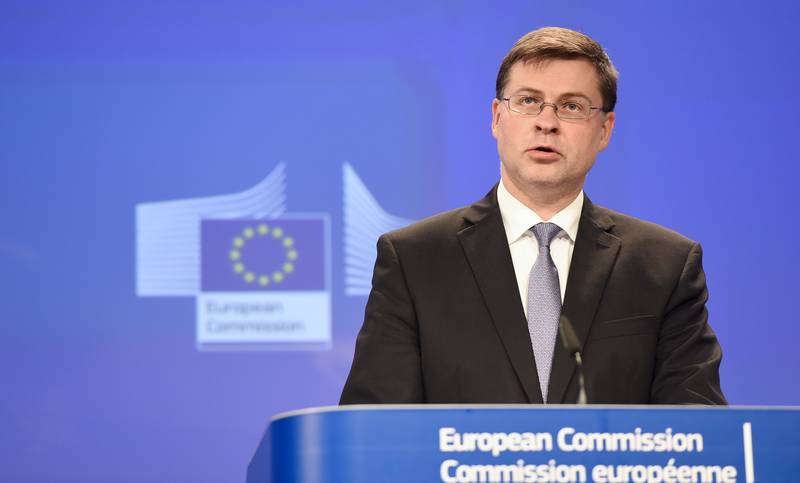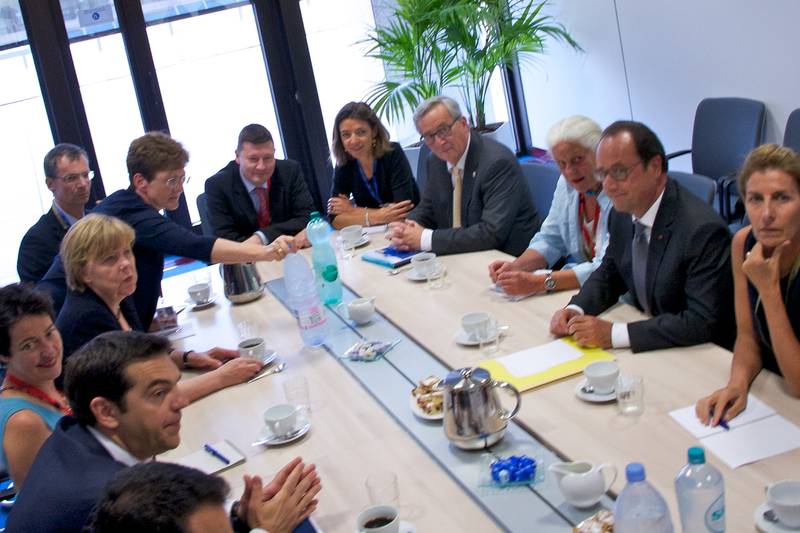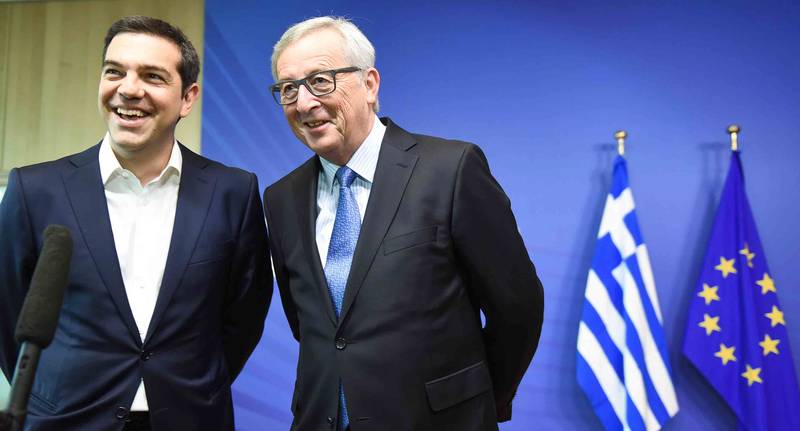EU Brings Out the Bag of Carrots for Greece
Adelina Marini, July 21, 2015
 The change of tone of EU towards Greece over the last week is significant. The GRexit came out of the agenda, the Eurozone is back in work mode and started to prepare the next programme with Greece and even the flow of cash towards Athens is back on line. It is surely difficult to tell if this is the final attempt at saving Greece, for the past months showed nothing is final, there is no truly final deadline, and there’s always a way, as European leaders have repeatedly said, including Chancellor Angela Merkel, a supporter of the motto ”When there’s a will, there’s a way."
The change of tone of EU towards Greece over the last week is significant. The GRexit came out of the agenda, the Eurozone is back in work mode and started to prepare the next programme with Greece and even the flow of cash towards Athens is back on line. It is surely difficult to tell if this is the final attempt at saving Greece, for the past months showed nothing is final, there is no truly final deadline, and there’s always a way, as European leaders have repeatedly said, including Chancellor Angela Merkel, a supporter of the motto ”When there’s a will, there’s a way."
EU has found a way
Although we have a new deal for Greece, there are too few new things in it. One of the inventions that former Finance Minister Yanis Varoufakis insisted vehemently on as early as January was the agreement for bridge financing, which would help the government in Athens pay the overdue instalments on the credits and keep their head above water while the negotiations over the third bailout programme were under way. When Mr Varoufakis demanded such bridge financing he wanted it in order to avoid extension of the second bailout programme, for he believed it was wiser to start negotiations on a new one. The Eurogroup, however, was adamant, unaware of how much more difficult communication with Athens with the government of Alexis Tsipras would be, that the second programme needs to finish first before any roadmaps to a third one even begin to be discussed. End of the day the Eurogroup "won" a four-month extension, but the second programme went down in history on June 30 just like the first one - incomplete.
Greece has already tasted bankruptcy, masked until now namely by the two unfinished programmes, so it knelt to the Eurogroup’s conditions, and is now beginning to receive the sweeteners in exchange. First, the bridge financing. Last week ended with the agreement to release 7.16 bn Euros as short-term financing for Greece. This happened late Friday afternoon. After several days of consultations it was agreed this would happen through a nearly forgotten mechanism – the European Financial Stabilisation Mechanism (EFSM). It was created for all 28 members of the EU to help them in times of dire financial problems. The mechanism allows the EC to borrow money from the international financial markets on behalf of the entire EU in volume of up to 60 billion Euros, guaranteed by the common European budget.
The reason to choose this model is that conditions to be met before using money from the permanent assistance fund of the Eurozone, the ESM, are much stricter and ask for a full-bodied programme, whereas this is about short-term financing with maximum maturity of three months. The goal of this financing is allowing Greece to pay up the arrears to the International Monetary Fund and the National Bank of Greece, as well as repay the ECB. Surely, those funds were also released under conditions, some of which with a July 15 deadline. We are talking about the VAT system reform, which provided for a flat 23% rate, only discounted to 13% for essential foodstuffs, energy, hotels, and water, and another discount down to 6% for pharmaceutical products and culture (books and theatre). Greece was also expected to vote in legislation increasing retirement age to 67 years, raising health insurance premiums for pensioners from 4% to 6%, and ensuring the independence of the Greek statistics administration.
All of these laws were voted in by Greek Parliament in the early hours of last Thursday, instantly re-activating European generosity. In exchange for releasing the seven billion Euros short-term aid Europe required also that a special account be opened in the Greek National Bank that will manage this aid. It is not the first time the Eurogroup requires an escrow account. This was also done in the winter of 2012 when the negotiations for the second bailout programme were underway. Then, in a situation faintly resembling today's, Greece’s partners in the currency block did not trust the Greek government to fulfil the commitments it made. So, based on Germany and France’s idea, an escrow account was opened to pay back loans to the EU and the IMF with priority, and the remainder to be used by the Greek government to cover its expenses.
 The European Commission confirmed on Monday (July 20th) that the sum had already been transferred to the Greek government. Spokesperson Mina Andreeva expressed confidence that the Greek government would pay the overdue bills that same day and it did. Now all that is left is for Tsipras's government to respond with the next portion of the promised reforms with a July 20th deadline. The EC explained it is working in close cooperation with Greek authorities on the new legislation, but it is not yet certain when the representatives of the institutions will go back to Athens for field work on the preparation of the third bailout programme.
The European Commission confirmed on Monday (July 20th) that the sum had already been transferred to the Greek government. Spokesperson Mina Andreeva expressed confidence that the Greek government would pay the overdue bills that same day and it did. Now all that is left is for Tsipras's government to respond with the next portion of the promised reforms with a July 20th deadline. The EC explained it is working in close cooperation with Greek authorities on the new legislation, but it is not yet certain when the representatives of the institutions will go back to Athens for field work on the preparation of the third bailout programme.
Special solidarity through the European funds
Last week the EU opened one more purse that is no secret either. On July 15th he EC presented another communication introducing more relief, especially for Greece in the utilisation of money from the European funds aimed at boosting investment. The EC named this communication “Plan for jobs and growth in Greece” whose goal is to encourage the Greek government’s reformatory efforts through European investment. The amount that the EC calculated Greece could receive is 35 billion Euros. It is an emergency measure to allow Greece to use the remaining funds allocated to it in the EU 2007-2013 budget by the end of this year, when work on the past 7-year period ends. Over the last years Athens sharply increased its absorption rate of European funds due to the EC’s repeated introduction of discounts in the rules for EU funds absorption in an attempt to funnel money in the Greek economy at moments of hard reforms and depletion. Over the last four years Greece ranked among absorption champions climbing from number 18 to number 4.
At the moment the country is yet to receive 5% of the payments on different programmes for the 2007-2013 period. To encourage absorption by the end of the year the EC raises the co-financing threshold to 100%. This means instant liquidity of around 500 million Euros and saved expenses from the Greek budget of around two billion Euros, says in the communication. In order to use the new discount the Greek government must guarantee this money will go directly to the beneficiaries for financing of programmes projects. In addition, in the 2014-2020 budget the EC raises preliminary financing by seven percentage points. According to the executive body of the EU’s calculations, this will bring in an additional one billion Euros. They can only be used on starting projects on the EU’s cohesion policy.
The EU reminds that the support and relief from which Greece has benefited in recent years and will receive in coming years from the EU, member states, other international parties and private investors amounts to more than 400 billion Euros. This amount includes 240 billion Euros financial aid under the two bailout programmes, 42 billion Euros European financing through the common budget over the 2007-2013 period, 24 billion of which from the Structural and Cohesion funds, fisheries and rural development funds, and around 17 billion Euros for direct payments to farmers and support measures for agricultural markets. In this amount the EU includes the 35 billion Euros financing for the 2014-2020 budget period, 20 billion of which are expected from the Structural funds and 15 billion from the agricultural fund. 100 billion of private investment is expected through the investment plan, which was recently approved.
The EC stresses that the full amount of 400 billion Euros represents over 230% of the Greek Gross Domestic Product for the year 2014, or around 38 000 Euros per capita. "The amount of EU and international funds for Greece today already exceeds the US Marshall Plan devised for the whole of Europe after the Second World War", continues the EC communication. It also reminds that Greece is receiving preferential treatment due to its very specific circumstances. In exchange, the Union expects that Greek authorities will establish a mechanism to guarantee that all additional funds received under  these measures will be used solely by the beneficiaries and this will go parallel to the agreed structural reforms.
these measures will be used solely by the beneficiaries and this will go parallel to the agreed structural reforms.
The European Commissioner for Regional Policy Corina Crețu stressed that "the reforms agreed in the Euro Summit are absolutely necessary for growth and jobs". On Wednesday the Greek Parliament is to vote on the new Code of Civil Procedure, as well as adopt the Bank Recovery and Resolution Directive. Raising the retirement age is not on the Wednesday’s agenda, however, reports the Greek newspaper Kathimerini, quoting a press release from the government in Athens. According to this press release, the pension reform was not included in the prior actions. This is in controversy with the text of the agreement for short-term assistance, where the pension reform and especially increasing the retirement age is expressly mentioned.
Translated by Stanimir Stoev
 Klaus Regling | © Council of the EU
Klaus Regling | © Council of the EU Mario Centeno | © Council of the EU
Mario Centeno | © Council of the EU Mario Centeno | © Council of the EU
Mario Centeno | © Council of the EU